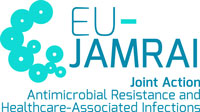ACCESS
EU-JAMRAI 2 focuses on concretely improving access to selected AMR-related products both for human and veterinarian use that are clinically important but with a vulnerable supply, by addressing the specific barriers to sustainable and reliable access nationally and across Europe. The initiative’s activities are designed to identify barriers, foster coordination and collaboration, and implement prioritized and tailored solutions – ensuring that critical products reach patients and animals across Europe when needed and ultimately contributing to the broader goal of reducing AMR and its societal impact.
This work brings together 16 countries, mainly represented by national public health agencies, medical product authorities, ministries of health and research institutes. To support sustainability build synergies, we are continuously working in close collaboration with key European stakeholders, including HERA, EMA, ECDC, WHO Europe and European pharmaceutical industry associations.
How does the Access work performed in EU-JAMRAI 2 support the implementation of the EU Council recommendation of AMR?
EU-JAMRAI 2 has the opportunity to serve as a link between policy and implementation. A key policy document directing our work is the 2023 Council Recommendation on stepping up EU actions to contain antimicrobial resistance (AMR) in a One Health approach.
The access work of EU-JAMRAI 2 supports the following recommendations:
- Take appropriate national measures aimed at ensuring that, by 2030, at least 65 % of the total consumption of antibiotics in humans belongs to the Access group of antibiotics as defined in the AWaRe classification of the WHO (16) (by improving availability of antibiotics in the MS belonging to the Access group).
- Promote in a coordinated manner with national and multicountry initiatives, the development of and accessibility to antimicrobials and other medical countermeasures relevant to combat AMR in humans […] (29)
- Continue to support Member States in identifying priority antimicrobial resistant pathogens at Union and Member State level, in mapping existing, upcoming and missing AMR medical countermeasures, and in defining target product profiles in alignment with national initiatives (29a)
- Improve the continuity of supply of antimicrobials and other AMR medical countermeasures in the EU, notably, in liaison with Member States, by supporting and coordinating Member States’ initiatives on the manufacturing, procurement and stockpiling and by addressing hurdles at EU level (29c)
- Improve demand forecast, assessing and addressing antibiotics supply chain vulnerabilities, and implement targeted antibiotics stockpiling actions as appropriate, to avoid shortages. (29d)
- Contribute to the design and governance of a Union multi-country pull incentive scheme in order to improve innovation, the development of new antimicrobials and access to existing and new antimicrobials where Member States can participate on a voluntary basis […]. (30)
- Incentivise the development and placing on the market of effective and evidence-based alternatives to the use of antimicrobials and of vaccines for animal health (33)
- Enhance the cooperation on AMR between professionals working in human health, veterinary, environment and agronomy sectors and with stakeholders, in order to improve the One Health approach on AMR. (36)
Other policy documents of importance for the access work of EU-JAMRAI 2:
- UNGA Political Declaration: A global commitment to combat antimicrobial resistance.
- Individual countries’ National Action Plans.


Focus products
Partner countries have identified clinically important antibiotics and veterinary vaccines with a national vulnerable supply. The selection of these products is based on an assessment of national clinical needs, availability, and resistance patterns, informed by consultations with relevant stakeholders and data analysis. The list of focus products may be updated as the project advances.
Please click on a turquoise country to see the national focus products.
France

Amoxicillin, clavulanic acid (human)
Aztreonam (human)
Benzathine benzylpenicillin (human)
Cefixime (human)
Fosfomycin (human)
Phenoxymethylpenicillin (human)
Rifampicin (human)
Rifampicin, isoniazid (human)
Rifampicin, isoniazid, pyrazinamide (human)
Rifapentine (human)
Sulfamethoxazole, trimethoprim (human)
Vaccine for turkey rhinotracheitis virus (Veterinary)
Vaccine for clostridium related diseases in ruminant (Veterinary)
Vaccines for Muscovy ducks against Derszy disease ± parvovirosis (Veterinary)
Spain

Amikacin (human)
Aztreonam (human)
Benzathine phenoxymethylpenicillin (human)
Cefadroxil (human)
Sulfamethoxazole, trimethoprim (human)
Oxytetracycline (veterinary)
Vaccines for hemorrahagic enteritis in turkeys (veterinary)
Vaccines for respiratory disease complex in cattle/sheep/goats (veterinary)
Vaccines for coccidiosis (veterinary)
Belgium

Cefadroxil OR Cefalexin (human)
Daptomycin (human)
Phenoxymethylpenicillin (human)
Procaine-benzylpenicillin OR Benzathine Benzylpenicillin (human)
Rifampicin (human)
Sulfadiazine, trimethoprim (human)
Sulfamethoxazole, trimethoprim (human)
Thiamphenicol (human)
Amoxicillin (veterinary)
Cefalexin (veterinary)
Doxycycline (veterinary)
Trimetoprim, sulfadimethoxin (veterinary)
Trimetoprim, sulfadimidine (veterinary)
Bulgaria

Amphotericin B “liposomal” (human)
Benzylpenicillin (human)
Ceftaroline (human pediatric only)
Daptomycin (human)
Eravacycline (human)
Erythromycin (human)
Fosfomycin (human)
Nitrofurantoin (human)
Phenoxymethylpenicillin (human)
Tobramycin (human)
Denmark

Flucloxacillin (human, pediatric)
Fosfomycin (human)
Nitrofurantoin (human)
Pivmecillinam (human)
Ampicillin (human and veterinay)
Benzylpenicillin (/procaine benzylpenicillin) (human and veterinary)
Gentamicin (human and veterinary)
Phenoxymethylpenicillin (human and veterinary)
Rifampicin (human and veterinary)
Amoxicillin (veterinary)
Fucidic acid (veterinary)
Sulfadiazine, Trimethoprim (veterinary)
Finland

Amoxicillin (Human)
Benzylpenicillin sodium (Human)
Nitrofurantoin (Human)
Phenoxymethylpenicillin (Human)
Rifampicin (Human)
Cloxacillin (veterinary)
ERM vaccine for fish (veterinary)
Gentamicin (veterinary)
Phenoxymethylpenicillin (veterinary)
Procaine benzylpenicillin (veterinary)
Trimethoprim, Sulfonamide (veterinary)
Iceland

Amoxicillin (human and veterinary)
Amoxicillin and beta-lactamase inhibitor (human and veterinary)
Benzylpenicillin / Procaine benzylpenicillin (human and veterinary)
Cefalexin (human and veterinary)
Dicloxacillin (human and veterinary)
Phenoxymethylpenicillin (human and veterinary)
Sulfamethoxazole, trimethoprim (human and veterinary)
Sulfadiazine, trimethoprim (human and veterinary)
Clindamycin (veterinary)
Enrofloxacinum (veterinary)
Oxytetracycline ( veterinary)
Italy

Amikacin (human)
Azithromycin (human)
Benzathine benzylpenicillin (human)
Chloramphenicol (human)
Clarithromycin (human)
Piperacillin, tazobactam (human)
Netherlands

Amoxicillin (Human)
Amoxicillin, clavuanic acid (Human)
Benzathine benzylpenicillin (Human)
Benzylpenicillin (Human)
Cefazolin (Human)
Ceftazidim (Human)
Ciprofloxacin (Human)
Clindamycin (Human)
Doxycycline (Human)
Metronidazole (Human)
Phenoxymethylpenicillin (Human)
Rifampicin (Human)
Sulfamethoxazole, trimethoprim (human)
Innovative vaccines against emerging and novel animal diseases (veterinary)
Norway

Benzylpenicillin (human)
Dicloxacillin (human)
Doxycycline (human)
Erythromycin or clarithromycin (human)
Flucloxacillin (human)
Gentamicin (human)
Phenoxymethylpenicillin (human)
Pivmecillinam (human)
TB antibiotics from WHO guidelines (human)
Procaine benzylpenicillin (veterinary)
Salmon vaccines (veterinary)
Poland

Azithromycin (Human)
Aztreonam (Human)
Benzathine benzylpenicillin (Human)
Benzylpenicillin sodium (Human)
Cefalexin (Human)
Flucloxacillin (Human)
Minocycline (Human)
TB antibiotics from WHO guidelines (Human)
Slovenia

Amoxicillin (human)
Cefuroxime (human)
Clarithromycin (human)
Flucloxacillin (human)
Gentamicin (human and veterinary)
Phenoxymethylpenicillin (human)
Tuberculosis antibiotics (human)
Vaccination for dengue (human)
Vaccine for erysipelothrix (Veterinary)
Sweden

Amoxicillin (human)
Ceftibuten (human)
Cefixime (human)
Colistin (human)
Phenoxymethylpenicillin (human)
Procaine benzylpenicillin (veterinary)
Rifampicin (human)
Sulfamethoxazole, trimethoprim (human)
Temocillin (human)
Trimethoprim, sulfadiazine (veterinary)
Malta

Amoxicillin (human)
Aztreonam (human)
Cefalexin (human)
Cefazolin (human)
Clindamycin (human)
Co-trimoxazole (human)
Fosfomycin (human)
Temocillin (human)
Oxytetracycline (Veterinary)
Vaccine for bovine parainfluenza virus, bovine respiratory syncytial virus and pasteurella (Veterinary)
Vaccine for bovine rotavirus, bovine coronavirus and escherichia (Veterinary)
Greece

Aztreonam (human)
Tobramycin (human)
*Greece joined the Access work package after the project start and thus may have fewer focus products
Latvia

Aztreonam (Human)
Daptomycin (Human)
Fosfomycin (Human)
Phenoxymethylpenicillin (Human)
Pivmecillinam (Human)
TB antibiotics from WHO guideline (Human)
*Latvia joined the Access work package after the project start and thus may have fewer focus products
Antibiotic assessment guide
Here you find the methodology that was applied by the countries to identify their focus products for human use (the veterinary methodology will be added here shortly).

Barriers to access
Participating countries have finalized an analysis of the national barriers impacting sustainable and reliable access to each of their focus products. Through collaboration with key stakeholders and data-driven assessments, the analysis uncovered actionable barriers across economic, regulatory, and supply chain dimensions.
This stakeholder-inclusive and granular approach has generated unprecedented insights into the unique factors influencing national availability to the focus products. Summarized findings will be published here soon.
Barrier analysis guide
Here, you find the guide that was used by the countries to analyse the national barriers to sustainable and reliable access to their focus products.

Targeted interventions
Based on the results from the barrier analyses, participating countries are now prioritizing and tailoring concrete interventions at the national, regional, and European levels to improve access to their national focus products. The main focus from now on is to work on implementation of these targeted interventions.

New Products
When it comes to strengthening access to new technologies, like novel antibiotics and bacteriophages, EU-JAMRAI 2 are aiming to assist DG HERA and other European bodies in their efforts and serve as a discussion forum for these questions.
Read the conference report from our kick-off event, “Sustainable implementation of human phage therapy across the EU”, held in Brussels, Belgium on March 1st, 2024.
Registered antibiotics for tuberculosis in EU/EEA countries and UK
This spreadsheet contains an extract of the Article 57 database received from EMA with information up to July 27, 2025. This may be helpful for those individuals procuring antibiotic for tuberculosis to better understand which products are marketed, where they are marketed, under which regulatory pathway, and the contact information for the marketing authorization holder.
Please note that the terms below apply.
- The information provided is based on data held in the Article 57 database. This data is submitted by holders of marketing authorisations (MAHs) for medicines in the European Union and the European Economic Area. The provided data reflects the state of the Article 57 database on 27 July 2025 as extracted on 28 July 2025.
- A medicinal product may contain multiple pharmaceutical products (administrable pharmaceutical forms), e.g. tablets and film-coated tablets, or tablets with different compositions as part of a same medicinal product. These forms are listed in sequence and separated by a “|” sign.
- MAHs must submit information to the European Medicines Agency (EMA) on authorised medicines and keep this information up-to-date in accordance with EU pharmaceutical regulation.
- The following Guidance can be consulted for more information on how and when Article 57 data elements are to be populated: Detailed guidance on the electronic submission of information on medicinal products for human use by marketing authorisation holders to the European Medicines Agency in accordance with Article 57(2) of Regulation (EC) No. 726/2004, Chapter 3.II: XEVPRM User Guidance.
- Further information on the Article 57 database can be found here.
Webinars AND PRESENTATIONS
EU-JAMRAI 2 is continuously gathering and sharing experiences, evidence, and best practices on key topics related to access to AMR-related products. Explore our recorded webinars below:
Behavioural science of access
February 13, 2026
Securing access, improving lives: Strengthening patients’ access to off-patent medicines in Europe
December 10, 2025
An in-depth analysis of API and finished product producers in Sweden
October 08, 2025
First step in a Journey. Developing a National At Risk Medicine List
June 3, 2025
How do companies forecast anticipated demand?
October 11, 2024
Evidence for use of narrow(er) spectrum antibiotics in primary care
June 19, 2024
Spain’s efforts to strengthen access to antibiotics
January 26, 2026
UWWTD’s potential impact on access to antibiotics
November 04, 2025
Regulatory pathways for unregistered medicines, evidence from tuberculosis antibiotics for human use
September 12, 2025
Efforts to shift GP prescribing in Malta to narrower spectrum antibiotics
February 13, 2025
Individual dispensing of antibiotics in the Netherlands
September 16, 2024
